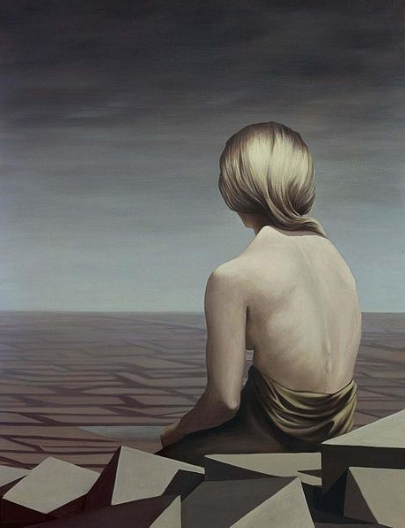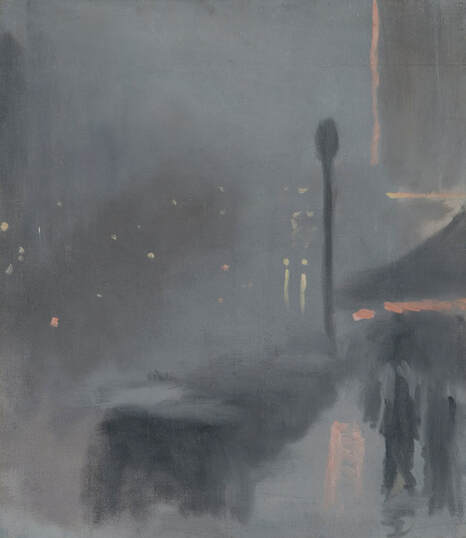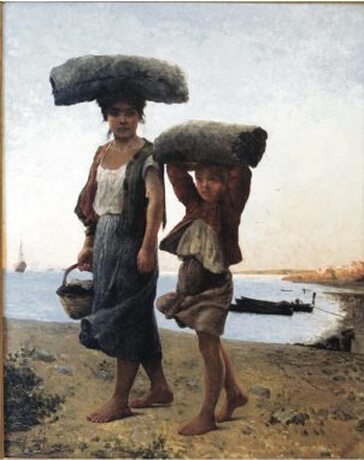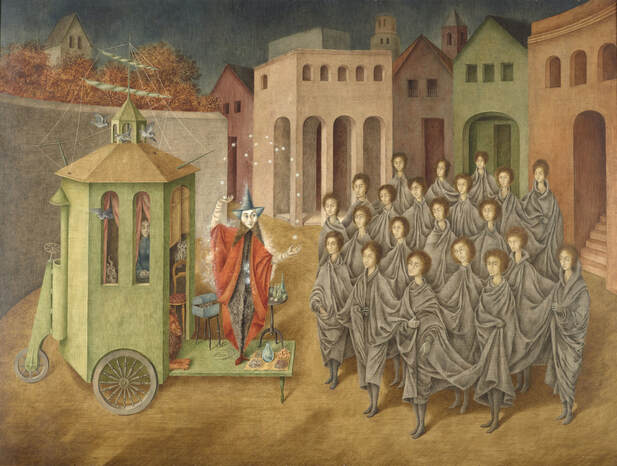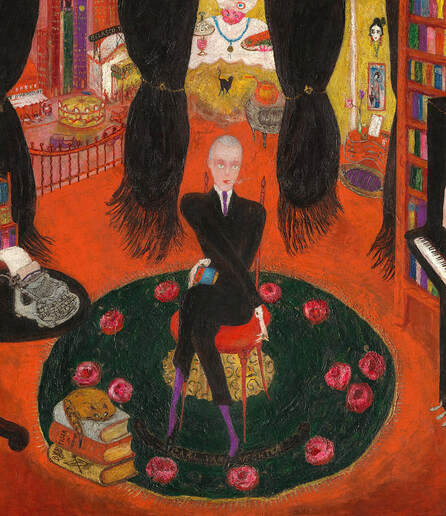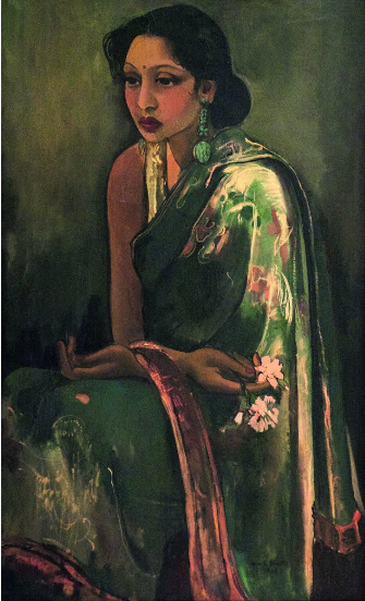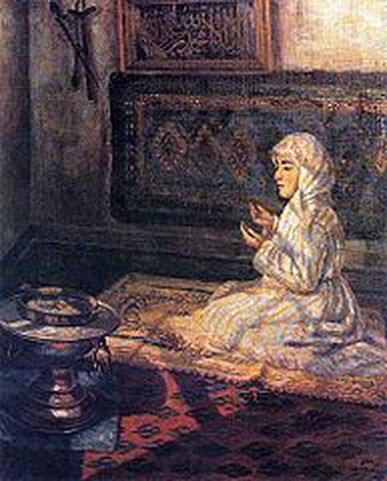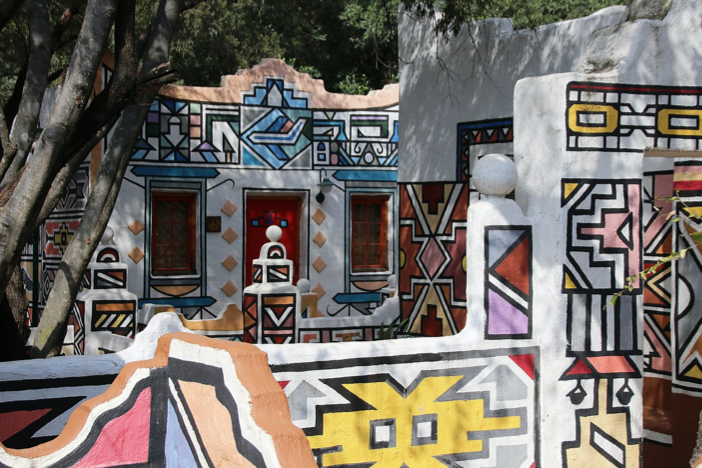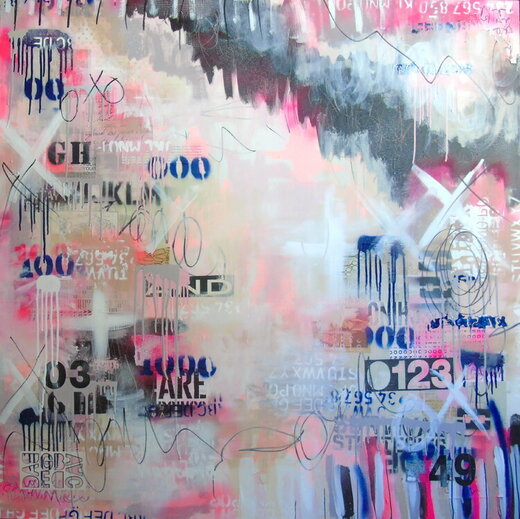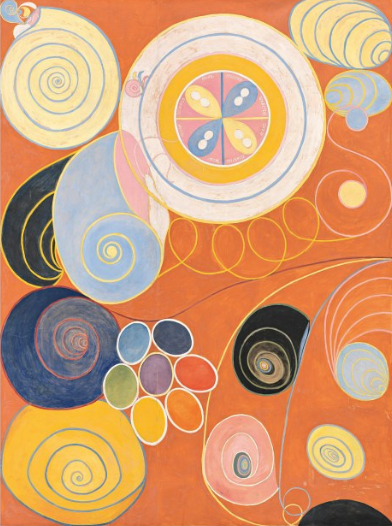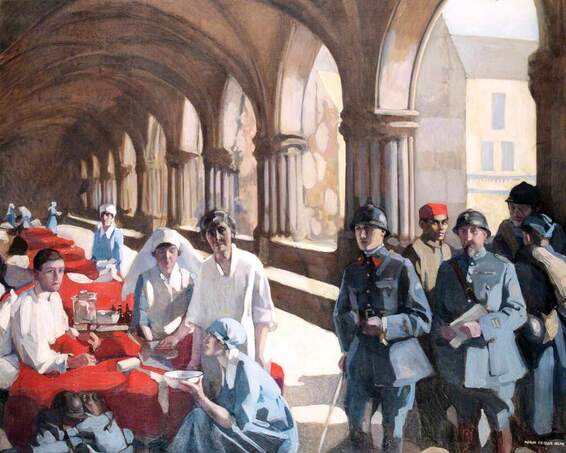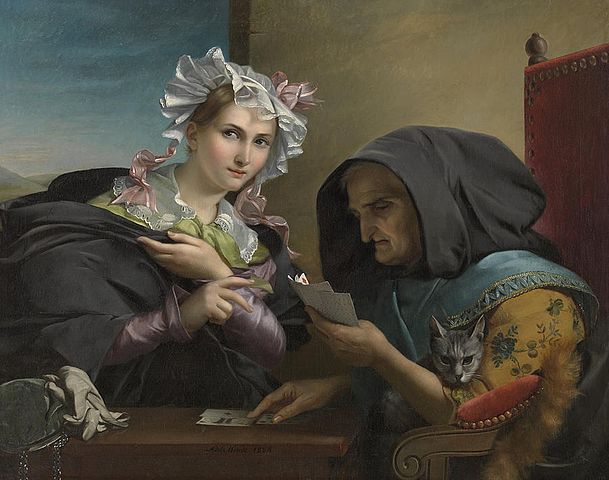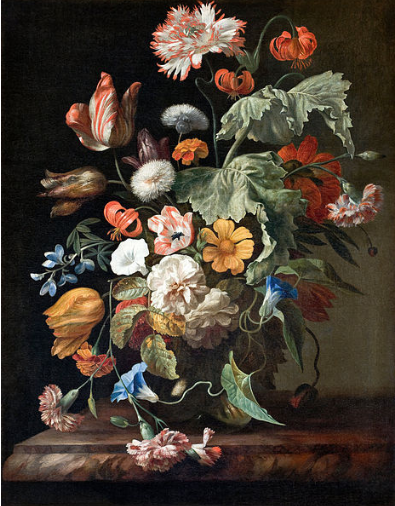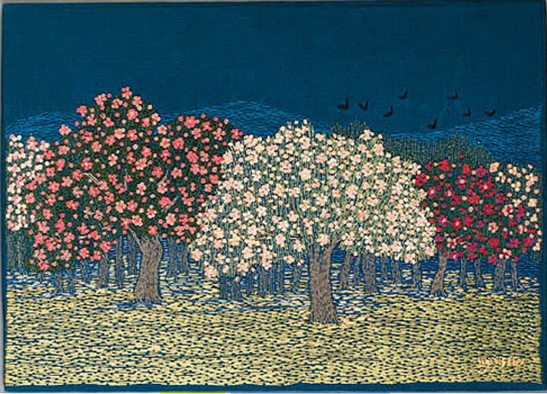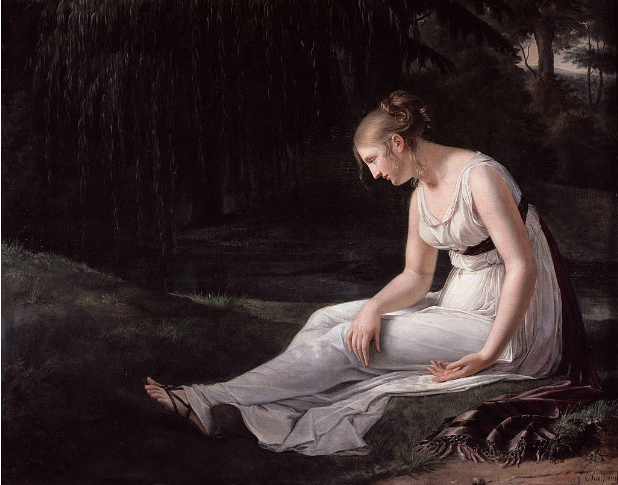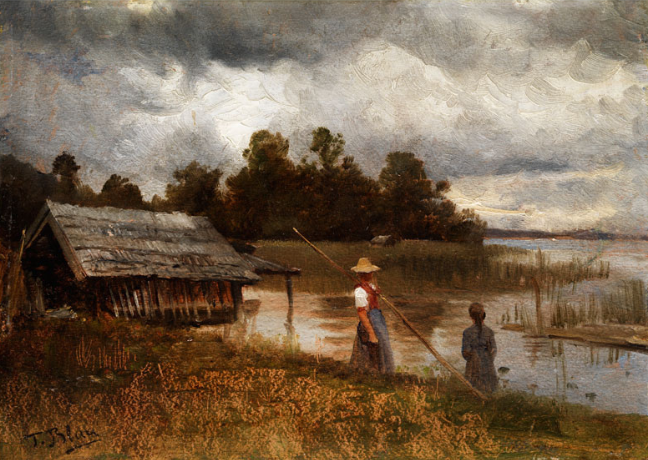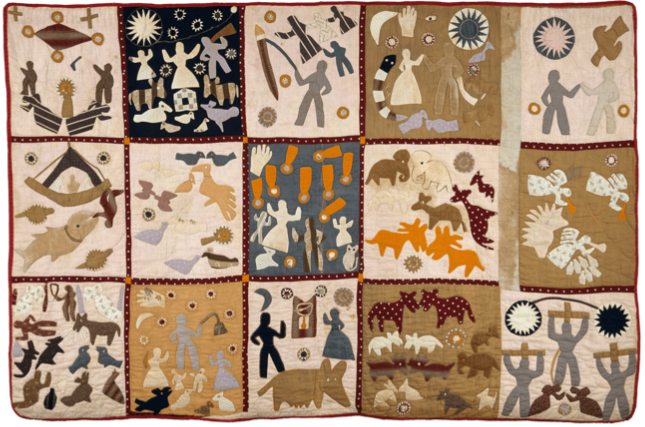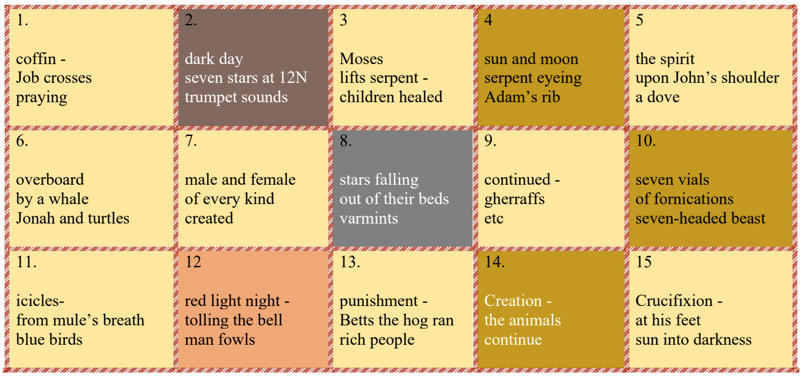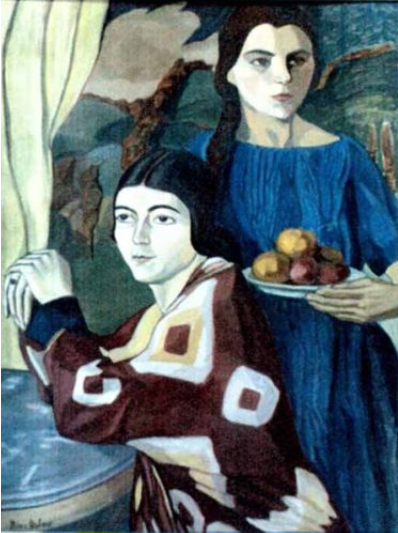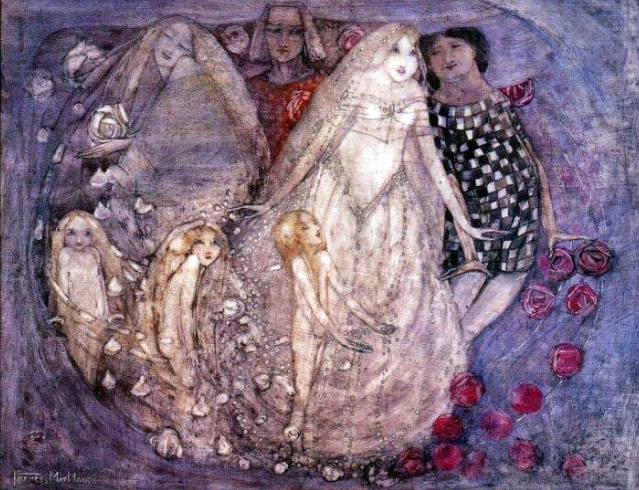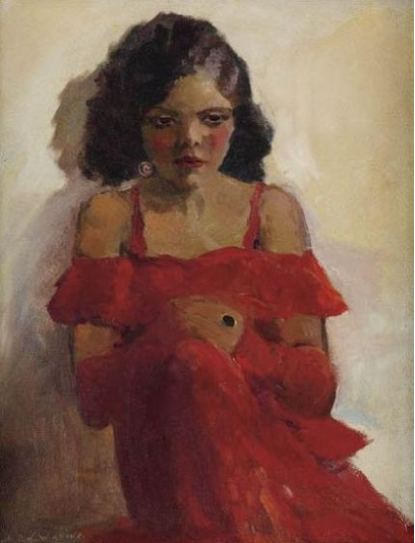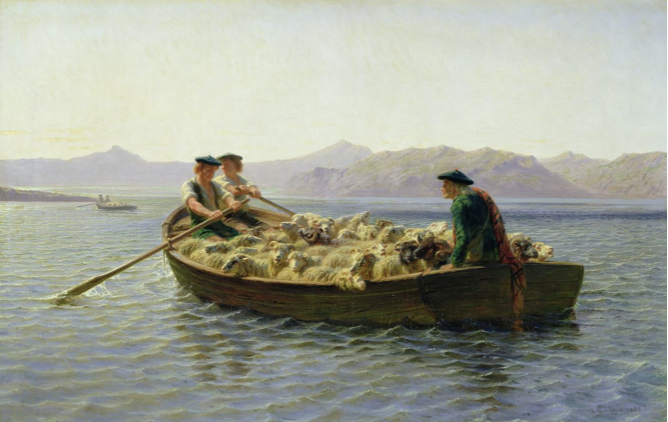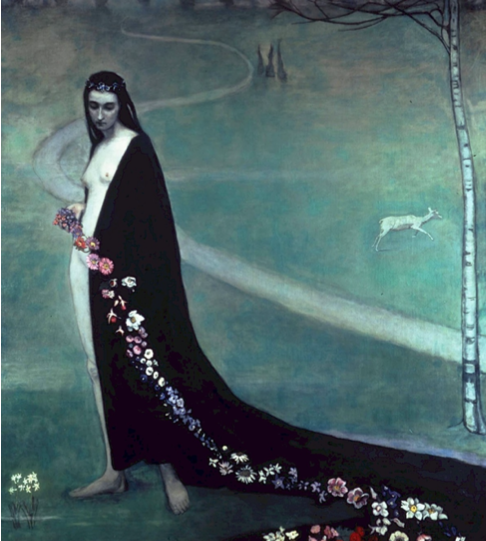|
Congratulations to the finalists for the Women Artists contest! The 24 pieces of poetry and prose (in no particular order) have given these artworks new life, approaching them in so many unique ways. Participants worked from a curated collection of art prompts by women artists. (Although the contest has finished, the sixty works can continue to inspire your writing practice, so get a copy at the end of this post if you don't have one.) Our special guest judge Alarie Tennille will choose the winner and two runners up from these finalists over the next few weeks. Stay tuned! The Finalists Merkabah: Ascension, by Sheikha A. The Travelling House of Spirits, by Suzy Aspell More Than Just a House, by Rose Mary Boehm Stolen Words Cross-Stitched From Harriet Powers’s Description of Her Pictorial Quilt*, by Dorothy Burrows Las Playeras, by Shelly Blankman Art is What We Are For, Actually, by Kate Copeland A Certain Symmetry, by Barbara Lydecker Crane Cut Flower Blues, by Helen Freeman Changing Pastures, by Karen George Group IV, No. 3. The Ten Largest, Youth, by Lynne Kemen Embroidery, Lily Yeats, by Jeanne Blum Lesinski Finches, by Linda Levitt You Are Here, by Sheila Lockhart Persephone, by Mary McCarthy Sumair, by Anita Nahal Self, by Stephanie Pressman You Can Tell, by Michele Parker Randall At Hôpital Auxiliaire 301, by Alun Robert Aggregated, by Kerfe Roig Taxi Rank, by Ravi Shankar Melancholy: Homage to Constance Marie Charpentier, by Sandi Stromberg Widowhood, by Sandi Stromberg Red Dress, by Fran Turner Taxi Rank, by Sarah Wyman Widowhood "Yves [Tanguy] was my only friend who understood everything," —Kay Sage Devoted to the surreal, she wandered torturous mazes, painted empty scaffolding when her husband suddenly died. Depression and decreased eyesight haunted “Watching the Clock” and “Tomorrow is Never.” It was “The Passage” she didn’t want and yet brushed onto canvas. A woman shorn of lover-wife persona. The landscape of widowhood, its barren fields and rocky support. Her art’s geometry. She remained faithful curator of Tanguy’s art. Until she painted “The Answer Is No.” Until she chose a bullet, had their ashes offered to Brittany’s wild coast. Sandi Stromberg Sandi Stromberg’s poetry has been nominated twice for a Pushcart Prize and for 2020 Best of the Net. She is a dedicated contributor to The Ekphrastic Review and recently contributed a Throwback Thursday (May 22). In 2021, the Review awarded her a Fantastic Ekphrastic Award for her contributions to the genre. Her poetry has appeared in many small journals and anthologies, including San Pedro River Review, The Ocotillo Review, Houston Chronicle-San Antonio Express-News, Snapdragon, Words & Art, Visual Verse, Weaving the Terrain, Enchantment of the Ordinary, and in Dutch in the Netherlands in Brabant Cultureel and Dichtersbankje (the Poet’s Bench). Taxi Rank Words chant water wash of oils where taxis wait a foggy Brisbane evening after the sun sank without notice and tender lights that edge the awnings glow their beckoning call but lovers hurry to their hired ride making their slow streak through the wet streets. Sarah Wyman Sarah Wyman writes and teaches on verbal / visual intersections and lives in the Hudson Valley where climbing feet kick dust down to a river-sea. Her poetry has appeared in aaduna, Mudfish, Ekphrasis Review, San Pedro River Review, Potomac Review, Petrichor Review, Heron Clan VII, Chronogram, and other venues. She is the author of Sighted Stones (Finishing Line 2018) and Fried Goldfinch (Codhill 2021). ** Taxi Rank "My pictures, like music, should speak for themselves." Clarice Beckett A train ride from the cliffs of Beaumaris, far from the arrays of vertebrate fossils buried in a gravelly bed, the seal bones and shark teeth, corals and crustaceans, a solitary woman pulls a homemade cart of paints in the rain. It’s hard to explain atmosphere. Overcoats and shoegazing umbrellas smudged in streaks of light, hazy with the ache of waiting for a taxi in the mist to return to care for an ailing mother and a bank manager father who would set ablaze most of his daughter’s canvases, painted en plein air, soon after she died of pneumonia. Distant intimacy or intimate distance glistens, almost still wet, blurry, a viola solo faintly rising behind a windowsill no more than a story above your head, beckoning but always just out of reach like the memory of a trip you have yet to take this life and never will. Ravi Shankar Dr. Ravi Shankar, is a Pushcart prize-winning poet, translator and professor who has published 15 books, including the Muse India award-winning translations Andal: The Autobiography of a Goddess and The Many Uses of Mint: New and Selected Poems 1997-2017. Along with Tina Chang and Nathalie Handal, he co-edited W.W. Norton's Language for a New Century: Contemporary Poetry from the Middle East, Asia & Beyond called "a beautiful achievement for world literature" by Nobel Laureate Nadine Gordimer. He has taught and performed around the world and appeared in print, radio and TV in such venues as The New York Times, NPR, BBC and the PBS Newshour. He has won awards to the Corporation of Yaddo and the MacDowell Colony, fellowships from the Rhode Island and Connecticut Counsel on the Arts, founded one of the oldest electronic journals of the arts Drunken Boat, and recently finished his PhD from the University of Sydney. His memoir Correctional is forthcoming in 2021 with University of Wisconsin Press. Las Playeras From daybreak until dark, days are the same for the playeras — beachgoers. No one knows their names. No one cares. Every day they trek side by side, madre and hija — mother and daughter — across the long stretch of beach between the dock and village to carry goods to market. They sell or they starve. The goods are stacked, carried on their heads, leaving their arms free for carrying baskets for more goods. It’s a delicate balancing act, an art handed down from one generation to the next — from bisabuela to abuela to madre, and now to hija. But muscles are slow to grow. It takes years to learn to balance a cumbersome bundle of wheat or wood on the head, leaving hands free for baskets full of extra goods and still move as quickly as possible against the wind over stone-cold sand to reach market before dark. Madre scrutinizes her child with the keen eye of a hen watching her hatchling. “Bien hecho, mi querida, bien hecho,” she whispers. Shelly Blankman Shelly Blankman and her husband, Jon, live in Columbia, Maryland, with their three rescue cats and foster dog. Their two sons, Richard and Joshua, live in New York and Texas, respectively. Shelly has spent most of her career in public relations and journalism, but her first love is poetry. Her work has appeared in many publications, including The Ekphrastic Review, Halfway Down The Stairs, Silver Birch Press, and Muddy River Review. Most recently, Richard and Joshua surprised her with a book of her own poetry, Pumpkinhead, She also enjoys making greeting cards, scrapbooking and, of course, refereeing pets The Travelling House of Spirits Come one, come all, come see magical tricks, here next to my mystical house on wheels. Watch, behold the juggling string of spells, one for you, many for me, treat from a flick of my hand. Raise your blank eyes back to my mother of pearl face, one star-flash will beguile your bewildered hearts. No longer wearing grey, you too will don a red cloak of mystery, sell spells to friends, carry owls in nimble legged chests, point goats at celestial skies and tame lions to worship at your feet. No more shadowy entrances and exits will pursue your steps. Wearing auras of billowy, silvery cloaks you will wizard leap into the air, sip smoke swirling flutes of riddle brimming elixir. Come, stare at my flickering hands, I’m twirling stars of hope into a rope of illusions. Suzy Aspell Suzy lives and works in Bedfordshire. Her work has appeared in Sledgehammer Lit and will be published in Spelt Magazine early July. Suzy wrote and directed two plays for the Civic Centre in Tainan, Taiwan, on British pantomime theme and is currently working on a pamphlet exploring feminine cultural and historical traditions. Writing ekphrastic poetry allows Suzy to combine her love of art and poetry, she loses herself for hours. Suzy is branching out into fictional short stories and is relishing the challenge. Suzy works in the travel industry and tutors English Language and Literature. Suzy tweets @susisu371 Art is What We Are For, Actually there's coincidence, fiction, non-fiction, fantasy, a naivety the books that tend to grow, poems up in piles, right up to ceilings and past frames, your suit an armour, your look an Annie Lennox roses on carpets and more cats to claim the dinner table, there is chicken breast for tea and chocolate to finish, a romance like a Marlene Dietrich movie and for a while it seemed that for every wrong thing each day a sweetness rose, a car being civil or a boy our son's age sun-smiling, never a you-haven't or I-won't as later, when the rain drained from a dawn sky when the skyscrapers swayed in infrared and whilst never a diary forgotten, a word you said missed, not one Saturday without opera or the Wednesday without notes, never more will the wild playing under flying stars nor your letters as leaves, typed up on the dot, bundled in an Indian tobacco box, never more the view from the salon and ever again, other wings then your own, loving, living insist on a lot of energy when did you decide to doubt desire into undesired? the art won't mind and I have no idea whether we live or create again Kate Copeland Kate Copeland started absorbing stories ever since a little lass. Her love for words led her to teaching and translating some silvery languages. Her love for art, lyrics and water has led her happily to -ekphrastic- poetry ... with some publications sealed already! She was born in Rotterdam some 51 ages ago and is fond of housesitting in the UK, the Americas and Spain. Sumair Like Mona Lisa, I carry secrets. Who doesn’t? I’m not smiling like Lisa, though. Amrita wanted me to be me. Sensual eyes and full silent lips. Forgotten stories seek answers. The slight bend at the shoulders, whispers I’m carrying, bode burdens and then some. Choosing green and pink, so I’d be close to mother and the marsh flows around me, flowers float on the marsh. He said he’d be home early. Wedding anniversary is not to be missed. The food now is icy. Candles have pulverized. And winter outside is relentless. I don’t feel like changing clothes. Shoot, it’s already morning. Thickened and darkened now is the marsh. Anita Nahal Anita Nahal is an Indian American poet, flash fictionist, children’s writer and columnist. Anita has two books of poetry, one of flash fictions, four for children and three edited anthologies to her credit. Her third book of poetry, What’s wrong with us Kali women, is due for release by Kelsay Books in August 2021. Two of her books are prescribed in a course on multiculturalism and immigration at the University of the Utrecht, The Netherlands. Anita teaches at the University of the District of Columbia, Washington DC. Anita is the daughter of Sahitya Akademi award winning Indian novelist, Chaman Nahal and educationist, Sudarshna Nahal. Anita resides in the US with her son, daughter in law and golden doodle. More on her at: https://anitanahal.wixsite.com/anitanahal Merkabah: Ascension for Saad Ali and Laura M. Kaminski (Halima Ayuba) The month approaches when the Ka’bah shall receive a new robe. She doesn't pray for world peace. She has seen a picture of black sails against a descending sun; an alcove of peace where music flows as piety; the san'aa has risen like a beacon on the rooftop of skewing daylight – she is reminded of the need to break in order to structure; to scatter to align. The month will end the year of yearning to probe towards mourning. Old shroud on the stone of salvation will be lifted and all that is and was shall be exposed. Pristine pearly flooring beckons locusts, these in another land of another shrine are welcome as warders; here, they swarm to be trampled on, almost willingly, under burdens of beasts of human embodiments. Their feet are large and small, heavy and light – disposed of colour – their heels are rivers of cracked destinies that still stomp loud, without care, on the bridge of light. Their prayer is a coarse bed of soft flakes. She isn't where she is – soul floats to greet pigeons that house the roof of God. They were put there to be saved. She tells them she doesn't want peace; her visit through raised hands to the sky search for Him and her understanding of His presence where there is need to be saved. She sits across burning coals and rusty incense, asking to be immersed – the need to scatter the need to align. Sheikha A. Sheikha A. is from Pakistan and United Arab Emirates. Her works appear in a variety of literary venues, both print and online, including several anthologies by different presses. Her poetry has been translated into Spanish, Greek, Arabic, Polish Italian, Albanian and Persian. More about her can be found at sheikha82.wordpress.com More Than Just a House Woman creates beauty. Owning a house is not enough. When your grandmother didn’t have colours, no brushes, her fingers would do. Dip, dip into white. Dip, dip into black. She made patterns. Her statement. Her art. You though have colours. You have brushes. You have yellows, pinks, blues, reds, purples… How about a ruler for your geometric designs? Esther Mahlangu uses only chicken feathers! Your husbands gift you gold bangles, beads, necklaces, pearls, cloth for the goddess that is you. You are waylaid by shiny things, but you never forget that the whole village, every house, is your canvas to create your home. Walking tall Ndebele woman shines Divine excess Rose Mary Boehm Rose Mary Boehm is a German-born British national living and writing in Lima, Peru. Her poetry has been published widely in mostly US poetry reviews (online and print). She was twice nominated for a Pushcart. Her fourth poetry collection, THE RAIN GIRL, was published by Chaffinch Press in 2020. Want to find out more? https://www.rose-mary-boehm-poet.com/ You Are Here watching a bumblebee squeeze its furry abdomen into foxglove fingers you’re trying to work out how long it takes for a pollen molecule to travel from the soil up to its calyx you’re getting close but now you see another galaxy has formed a splotch of swirling grey in a pink universe how many is that now? you count them one two three five hundred and sixty seven and the letters too directing pollinators to the hidden source of happiness and why not you? a message for bees can’t be that hard to decode it’s alphabetical after all a matter of triggering the right responses now the rain splashes silver curtains smearing pink and cream blurring outlines its drops tap-tapping on cups their pipes vibrate with fugal harmonies truths which must be recorded with mathematical precision using special symbols on graph paper no easy task but the beauty of it oh the beauty of it makes you weep if only you could grasp its exactitude its magnificent systems everything would be clear there was a time you could enjoy simple pleasures of line patterns of colour as you would looking at an abstract painting no need to search for meaning everywhere until one day you started counting the number of flowers on each stem the number of bees ones twos threes stacking up behind your eyes and you began to see how every flower contains a universe that demands investigation how you could read their messages how they insisted on it you’ll have the answer worked out very soon you just need one more tiny calculation Sheila Lockhart Sheila Lockhart is a retired art historian and social worker living in the Scottish Highlands near Inverness, where she doesn’t do very much except look after some horses, a husband and her garden. She started writing poetry five years ago after her brother’s suicide and has been published online and in print in Northwords Now, Nine Muses Poetry, Twelve Rivers, StAnza Poetry Map of Scotland, Writers’ Cafe, The Ekphrastic Review, Re-Side and The Alchemy Spoon. Group IV, No. 3. The Ten Largest, Youth Burnt orange background for warmth roundness, spirals, buttery pinwheels- nothing pointy or masculine. Seashells, wombs, easter eggs in a basket Comets cartwheeling, planets spinning You are here. Rolling baked rolls with cinnamon- spirals, round, soft tops, toys, skeins of yarn, tails trailing. Roundness reaching into hugs, sweet embrace, delicate writing loopily scrawled, no signature, you know it’s me. Lynne Kemen Lynne Kemen lives in the Great Western Catskills of Upstate New York. Her chapbook, More Than A Handful (Woodland Arts Editions), was published in October 2020. Five of her poems appeared in Seeing Things Anthology, Robert Bensen, Ed. She has been published or has forthcoming poems in La Presa, Silver Birch Press, The Ravens Perch, Blue Mountain Review, What We See In our Journeys Anthology, Martin Willitts, Jr, Ed. ** Aggregated Why must we always quantify? 4, 3, 10. Add, subtract, multiply. Divide. Not earth. Not fire, nor sea. Air. Wind, light. Can you measure it? Will gravity seize these circles, still them, turn them into directions, lines with destinations? Spinning. We are. Always spiraling in and out of multiple centres, carried on particles with paths that can be seen but not located. The context manipulates and deconstructs us. The contours have no edges. We are always incomplete, impossible, imaginary, irrational, walking a metaphoric labyrinth after portents that do not exist. Implied, incongruent. A fraction of capacity. A composite of probability. Add, subtract, divide. Multiply. The answer always remains. Kerfe Roig A resident of New York City, Kerfe Roig enjoys transforming words and images into something new. Follow her explorations on her blogs, https://methodtwomadness.wordpress.com/ (which she does with her friend Nina), and https://kblog.blog/, and see more of her work on her website http://kerferoig.com/ At Hôpital Auxiliaire 301 Wheeled us on makeshift beds heard our cries felt our curses smelt mustard agent in our lungs tasted blood dressed contusions extricated shattered limbs saved expendable lives sanitised with vigour stitched up our deep wounds fed us Maconóochie on beds in the Cloisters witnessed shell shock did not know how to treat it. Wheeled us off back to Blighty to mothers to lovers to wives of the dead and fatherless children. Wheeled in the Mistress Ivens CMO Royaumont for honor and recognition after the trauma of the Great War to Palais de la Légion d’Honneur on the left bank of the Seine as saviour of stricken soldiers in the war to end all wars. Alun Robert Alun Robert is a prolific creator of lyrical free verse. He has achieved success in poetry competitions across the British Isles and North America. His work has been published by many literary magazines, anthologies and webzines in the UK, Ireland, Belgium, Italy, India, South Africa, Kenya, USA and Canada. Since 2018, he has been part of The Ekphrastic Review community particularly enjoying the fortnightly challenges. He is a member of the Federation of Writers Scotland for whom he was a Featured Writer in 2019. A Certain Symmetry Around her girth, a heavy cloak conceals my friend’s condition. She’s doubtful cards will show her baby’s birth; her trace of smile reveals amusement. But she suggested this tableau, this study of extremes, for me to paint– one woman young and lovely, dressed in silk to show how she can spend without constraint– the other old and worried, of some ilk that’s foreign, born to struggle on the fringe, with beaky, furrowed face and sallow skin. The disparate pair do share a sort of hinge, however: I paint the same black cloth wherein if cloak and shroud of hood were joined, they’d fit. The women share the fate they can’t outwit. Barbara Lydecker Crane Barbara Lydecker Crane was a finalist for the Rattle Poetry Prize in 2017 and 2019. She has won two Pushcart nominations, two Laureate’s Choice awards from the Maria Faust Sonnet Contest, and First Prize in the 2010 Helen Schaible Sonnet Contest. She’s published three chapbooks: Zero Gravitas, Alphabetricks (for children), and BackWords Logic. Her poems have appeared in Able Muse, Ekphrastic Review, First Things, Light, Lighten Up Online, Measure, Mezzo Cammin, Think, Valparaiso Poetry Review, Writer’s Almanac, many others, and in several anthologies. She’s also an artist. Cut Flower Blues I’ve lost my soul. Have you seen it? Somewhere between the ruffle and splay of a petal – it slipped. Did you take it? I’ve sifted through pollen, past stigma and stamen, followed stem lines behind leaves, peered under a portly bee inside a chrysanthemum. Where’s it gone? I’ve listened to bluebell, wing whir, leaf drop, the slurp of nectar, the pop of bud clasp. Soil calls me home, my tubes weaken, my phantom roots rummage. Helen Freeman Helen Freeman has been published on several sites such as Ink, Sweat and Tears, Red River Review, Barren Magazine, The Drabble, Sukoon and the Ekphrastic Review. Her instagram page is @chemchemi.hf. She lives in Durham, England. Embroidery, Lily Yeats Dark hair swept up over her head, Susan Mary sits straight backed at the Dun Emer work table. She stares dark-eyed down at her work-in-progress held in a wooden frame. Hand poised over an apple orchard in pink and white bloom, the ground a pale sea of spring, she holds magenta silk thread in a wide-eyed needle: At the bottom of the panel, like the proud painter she is, this craftswoman stitch-signs her needle name in flaxen yellow silk: Lily Yeats. Jeanne Blum Lesinski Jeanne Blum Lesinski’s works have appeared in journals, lifestyle and gardening magazines, anthologies, and online. When not at her computer, she may often be in a garden or on a bike path. Melancholy: Homage to Constance Marie Charpentier Her right arm rests listlessly across her legs. The left arm limp, palm upturned as though waiting to be filled. Her head a sad flower under a weeping cloud that Keats knew so well. The lamentable familiarity. One might wonder why the Greek and Roman pantheons were bereft of a goddess of doubt and self-questioning. Why was it left to Hippocrates to propose Melancholy? She who embodies those qualities of suffering and sadness he called black bile. How like autumn this depression, as leaves fade and die with the summer. Torpor sinks into the soul, pensive, forlorn— the upturned palm waiting to be filled. Sandi Stromberg Sandi Stromberg’s poetry has been nominated twice for a Pushcart Prize and for 2020 Best of the Net. She is a dedicated contributor to The Ekphrastic Review and recently contributed a Throwback Thursday (May 22). In 2021, the Review awarded her a Fantastic Ekphrastic Award for her contributions to the genre. Her poetry has appeared in many small journals and anthologies, including San Pedro River Review, The Ocotillo Review, Houston Chronicle-San Antonio Express-News, Snapdragon, Words & Art, Visual Verse, Weaving the Terrain, Enchantment of the Ordinary, and in Dutch in the Netherlands in Brabant Cultureel and Dichtersbankje (the Poet’s Bench). You Can Tell I skip the dresses & shoes, costumes plumbed & plumed from a dead bird’s tail. Last year, my Met calendar stayed on my son’s birthday for a week. He’s fine. I blame Degas; he catches the moment between movements, brushes the same shaft of light onto dancers with hand-to-hair, hand-to-shoulder poses. I seek out my own birthday- art-day as the box opens, a fortune teller to show my future, offer up a sign. Will this year be drawn raw, sunsetty colors like last year’s Renoir? But, if the image reveals a copper & gold spur from 1400s Catalonia (sorry, September 4th babies), I’ll flip by in search of Waring’s Girl in Red, that ringed finger, & how the shadow becomes her. I find comfort in Blau’s Two Girls, the upland scenery that calls to me like Florida’s salt marshes in winter. Reed movement answers in the water. Something about sky, the graying day. Michele Parker Randall Michele Parker Randall is the author of Museum of Everyday Life (Kelsay Books 2015) and A Future Unmappable, chapbook (Finishing Line Press 2021). Her work can be found in Nimrod International Journal, Atlanta Review, Bellevue Literary Review, Tar River Poetry, and elsewhere. Stolen Words Cross-Stitched From Harriet Powers’s Description of Her Pictorial Quilt* Dorothy Burrows Note: These words have been taken and rearranged from Harriet Powers’s description, published online by Boston Fine Arts https://collections.mfa.org/objects/116166 Based in the United Kingdom, Dorothy Burrows enjoys writing poetry, flash fiction and short plays. This year, her poems have been published by various journals including The Ekphrastic Review, Spelt Magazine, The Alchemy Spoon, Dust Poetry Magazine, Visual Verse and Wales Haiku Journal. She tweets @rambling_dot Finches Nina and Ecaterina look out to the gleaming water to the hollow sky a bowl of plums in Nina’s arms Ecaterina placid in her robe considers the morning and what wisdom may alight on her shoulder like a finch shaking its feathers Linda Levitt Linda Levitt lives in Deep East Texas, where she teaches communication and media studies. She holds an MFA in creative writing from Texas State University and a PhD in communication from the University of South Florida. She reviews books for PopMatters and Spectrum Culture and published her first book, Culture, Celebrity, and the Cemetery: Hollywood Forever, in 2018. Self motherhood babies warm squirming infants giggle at games skin blushes deep pink roses sweet smell of the nape briny the three of them ma-ah-mam- ing all the time juggled for each for all for him for her for the cat for study for writing for painting drive home from class drive keep driving leave motherhood ropes the car turns it at the exit turns the key in the door wanting not wanting them wanting not wanting self to emerge as roses do bare branch to lush foliage startling bloom Stephanie Pressman A graphic artist and lifelong poet, Stephanie Pressman earned an MA in English from San Jose State University, taught writing at community college, and is the editor of her small press, Frog on the Moon. She served as co-editor of Cæsura and americas review. Her work has appeared in many journals, among them Bridges, The MacGuffin, Sing Heavenly Muse, Cauldron Anthology, Cæsura, The Broken Plate, and California Quarterly as well as on-line in Newport Review, Halfway Down the Stairs, Red Wolf Editions, The Ekphrastic Review, The Collidescope, Carmina Magazine, and others. Her long poem Lovebirdman appears in an illustrated volume published in June, 2018. Red Dress You came out of this belly, a slimy, squalling heap, already reaching. I want to feed your hunger. I try to give what you need. You’ve always frightened me with your yearning. Once I overheard a story of a beauty, a Trojan beauty who incited invasion and war. Beauty incites. But I want your dreams to flame into life and light of day, to burn through the night. When you saw the drape and danger in the fabric, you wanted the red of it, dreamed it into a dress. That’s why I bought red thread, borrowed the old woman’s sewing machine. And sewed the delicacy of this dress for you as once I’d sewn my own delights. I’m afraid to tell you that you are beautiful, but you are. Your eyes lower, not in modesty, but in silent confidence that abides no noisy intrusion of doubt. Here, this ring was given to me once, slipped onto my finger without thought of promise. It made my hand shine too. Fran Turner Fran Turner grew up on a farm in southern Ontario but she finds herself more at home in Toronto where she has lived most of her adult life. She has worked in nursing, cancer projects and cancer advocacy and taught at her own Aikido Dojo for many years. Writing is a recent and growing passion. Her short fiction has been published in online journals Dodging the Rain, Adelaide Review and The Ekphrastic Review. Changing Pastures Cool early summer afternoon on the channel, brisk wind not ideal for keeping a flock of thirty calm in a rocking boat. Between bleats of packed lambs and cries of kittiwakes nesting on chalky cliffs, my ears throb. The stink of sour ale wafts from my rowing mate, mixed with the gamey musk of hot, wet wool coats, queasies my stomach. I take shallow breaths, concentrate on sun silvering blue-green water in the distance, not the sharp peaks of dizzying waves alongside us. Iridescent moss mantles the valleys. I imagine the crimson clover, ox-eye daisy, and buttercup I saw when last visiting with my love, Elise. The sun soothes my arms, back, neck, matches the warmth of the ewe’s rhythmic heave against my shins. My arms ease into the cadence of tandem oaring. The white-haired sheepherder at the bow launches into a rousing sea shanty about a drunken sailor. My oarsman groans. When I inhale to join the song, I taste the water’s whiff—elemental, briny-sweet, wild. Karen George Karen George is author of five chapbooks, and the poetry collections from Dos Madres Press: Swim Your Way Back (2014), A Map and One Year (2018), and forthcoming Where Wind Tastes Like Pears (2020). Her work appears or is forthcoming in Adirondack Review, Valparaiso Poetry Review, MacQueen’s Quinterly, Juniper, I-70 Review, and Sheila-Na-Gig Online. She reviews poetry at Poetry Matters: http://readwritepoetry.blogspot.com/. Her website is: https://karenlgeorge.blogspot.com/. Persephone Still wearing winter’s shadow like a cloak over her shoulders she rises pale as the new moon, a whisper of light promising to wax full above the softening earth. Like the first spring greens waking from a long dream her thoughts are folded close, seeds praying for release. She steps into light like the gate of morning breathing flowers onto the lambent air. Where each day is the first day, and she forgets there was ever any other season past her last grey dreaming in the cold underworld, where she slept and waited cradled in the roots of trees, listening to the songs of rock and water that kept her company until she grew ripe enough for resurrection. Mary McCarthy Mary McCarthy is a retired RN who has always loved writing and art, finding both inexhaustible sources of inspiration. Her late discovery of ekphrastic work suits her natural inclinations, deepening the experience of appreciation and creation , making the journey from image to words both an exploration and an adventure. Her work has appeared in many journals and anthologies, most lately in The Plague Papers, edited by Robbi Nester, The Ekphrastic World, edited by Lorette C. Luzajic, and the latest issue of Earth’s Daughters.
4 Comments
Tom Riordan
7/17/2021 05:49:41 pm
If this poem had been written first, they would surely have named the Pharaoh cicada the Persephone cicada instead:
Reply
Mary McCarthy
7/20/2021 02:53:13 pm
Tom, I just saw your comment now...you got exactly what I was thinking of here, one of the layers of meaning I was playing with!! Thank you so much!!
Reply
7/18/2021 11:27:18 pm
What I love abut this poem is how positive the poet treats Persephone, and how her association with the Underworld reads like subtle shades grey. A nice interpretation.
Reply
Mary McCarthy
7/20/2021 02:55:22 pm
Maggie thank you for your generous comment! The Persephone story resonates for me on a personal level and seems so apt for our current situation.
Reply
Your comment will be posted after it is approved.
Leave a Reply. |
Challenges
|
